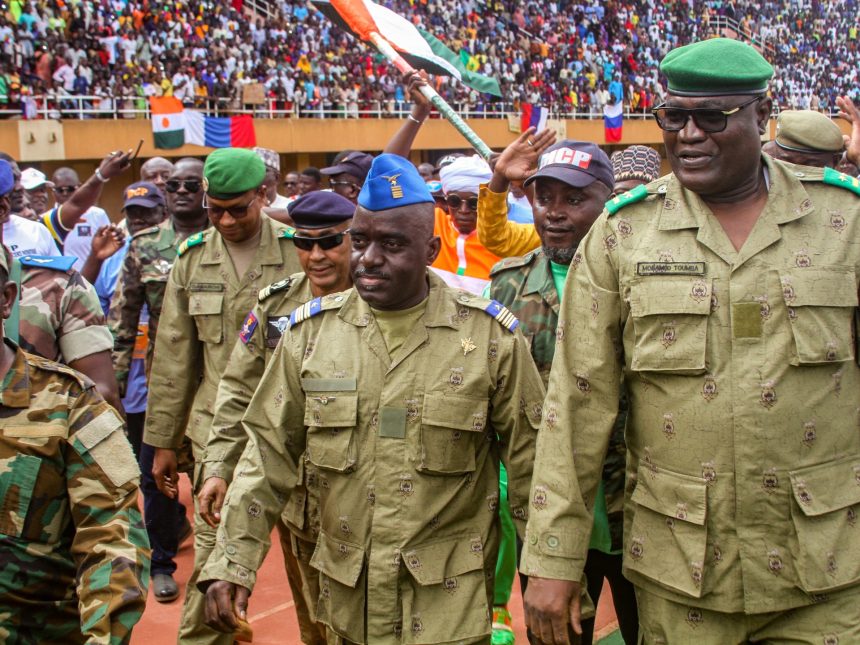Niger’s coup leaders have closed the country’s airspace after rejecting an ultimatum from West African states to reinstate deposed President Mohamed Bazoum or risk military intervention.
The move, announced late on Sunday, came as tens of thousands of coup supporters gathered at a stadium in Niger’s capital, Niamey, to cheer on the generals who seized power – or the National Council for the Safeguard of the Homeland (CNSP).
Amadou Abdramane, a spokesman for the CNSP, cited the threat of military intervention from the Economic Community of West African States (ECOWAS) for the airspace closure.
In a statement read out on national television, Abdramane said there had been a pre-deployment of forces in two Central African countries in preparation for intervention, but did not give details.
“In the face of the threat of intervention, which is becoming clearer through the preparation of neighbouring countries, Niger’s airspace is closed from this day on Sunday… for all aircraft until further notice,” he said.
“Niger’s armed forces and all our defence and security forces, backed by the unfailing support of our people, are ready to defend the integrity of our territory,” he added.
The coup in Niger on July 26 is the seventh in West and Central Africa in three years. It has rocked Africa’s Sahel region, which is battling armed groups linked to al-Qaeda and ISIL (ISIS) and is among one of the poorest areas in the world.
ECOWAS has condemned the coup, imposing severe economic and travel sanctions, including cutting off Niger’s power supply. The bloc’s defence chiefs have agreed on a possible military action plan, including when and were to strike, if the country’s detained leader is not released and reinstated by Sunday.
ECOWAS has not said what its next steps would be or when exactly on Sunday its deadline expires.
‘Not taking any risks’
Al Jazeera’s Charles Stratford, reporting from Senegal, said the Niger coup leaders’ decision to close the country’s airspace amounts to a “complete rebuttal of the demands by ECOWAS”.
“Niger’s coup leaders are not taking any risks,” he said.
“All eyes are now on ECOWAS’s next move. The bloc has said since the crisis began that all avenues will be explored and that any kind of military intervention would only be used as a last resort.
“There are fears about this potentially widening into a regional conflict and people are also very nervous about armed groups like ISIS, al-Qaeda taking advantage of any further chaos in the region.”
Amid the threat of regional war, West African countries are scrambling to pick a side. Nigeria, Senegal and Ivory Coast have said they would send troops, although the Nigerian Senate has pushed back against President Bola Tinubu’s request for a deployment approval, asking him to explore options other than the use of force.
Meanwhile, Burkina Faso and Mali – which are ruled by military-backed governments – have said any intervention in Niger would be considered a declaration of war against them. And Algeria, which shares a long land border with Niger, has also warned against a military solution.
Retired Colonel Festus Aboagye, a security consultant to the African Union and the United Nations, told Al Jazeera on Sunday that the success of ECOWAS’s plan depended on Nigeria’s ability to deploy its troops.
“The political timelines would be completely different from the military timelines. So what the politicians have stated, that is the ultimatum that lapses today, is not necessarily the D-Day or the day that the military initiates hostilities,” he said.
“In West Africa, Nigeria is everything. And it dates back to ECOWAS interventions in Liberia and Sierra Leone, under the banner of ECOMOG [Economic Community of West African States Monitoring Group].”
“Nigeria is a key player. It is a regional or sub-regional engine. But its Senate has not approved the request from the president of Nigeria for it to intervene in Niger,” he said.
Still, Aboagye noted that in 2017, then-Nigerian President Muhammadu Buhari deployed troops to The Gambia, without obtaining the legislature’s approval. That deployment resulted in the removal of The Gambia’s then-President Yahya Jammeh, who at the time was refusing to hand over power to election winner Adama Barrow.
‘We are going to fight’
The wider international community also appears divided on the issue of intervention.
France – Niger’s former colonial ruler, which has about 1,500 troops in the country – said it would “firmly” back whatever course of action ECOWAS takes after the deadline expired. But it did not specify if that included military assistance.
Russia, on the other hand, has opposed military intervention in Niger, while the head of its Wagner mercenary group has offered the services of his fighters to the country. Niger’s coup leaders have reportedly sought help from Wagner, which has become an influential force in Mali since the coup there in 2021 and has a longer-standing presence in the Central African Republic as well as Libya.
In Niamey, meanwhile, huge crowds flocked to a 30,000 seat stadium, carrying portraits of the country’s military leaders and booing former colonial power France.
The venue was draped in Russian flags.
In a speech at the stadium, General Mohamed Toumba, one of the CNSP leaders, denounced those “lurking in the shadows” who were “plotting subversion” against “the forward march of Niger”.
“We are aware of their Machiavellian plan,” said Toumba.
Coup supporters remained defiant.
“The Nigerien people have understood that these imperialists want to bring about our demise. And God willing, they will be the ones to suffer for it,” pensioner Amadou Adamou said at the stadium.
And in Niamey’s Boukoki neighbourhood, residents said they were ready to defend their country.
“We’re going to fight for this revolution. We’re not going to retreat faced with the enemy, we’re determined,” said Adama Oumarou.
“We have been waiting for this coup for a long time,” he added.









